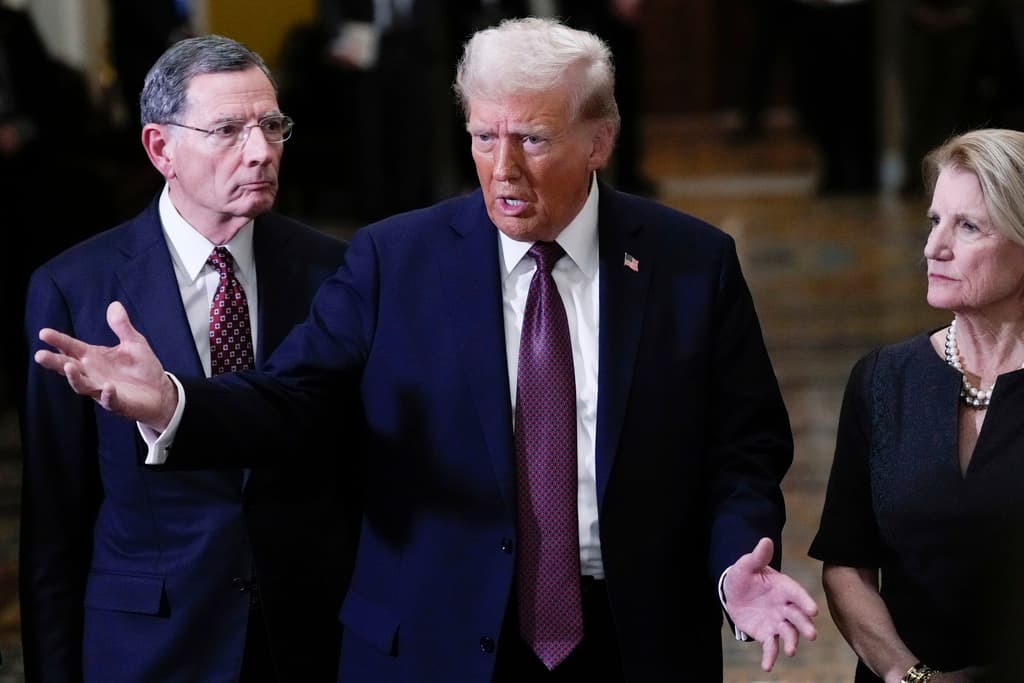Trump’s 100 Executive Orders: Get Ready for ‘Shock and Awe’ on Day One
Immigration, the economy, environment, energy, trade, foreign policy and much more.

President-elect Trump has set out an ambitious goal to enact 100 executive orders, according to reports — or, in some cases, less formal executive actions — in just his first day in office, which begins on Monday.
Dubbed by Team Trump as a “shock and awe” campaign, Trump’s executive orders and actions will reportedly range from the border and immigration to the economy and energy, as well as tackling cultural issues, so many, in fact, that he joked during the campaign that he wants a “tiny desk” at the Capitol, the site of the swearing in, where he can sit and sign orders.
Here’s what we know about Day One.
Border Security and Immigration
Trump recently met with Republican senators and outlined for them some of the issues on which he plans to move quickly.
Among them are finishing the U.S-Mexico border wall that he began building in his first term and constructing new detention facilities where migrants can be housed until they are expelled from the country.
Trump is also expected to re-enact his “Remain in Mexico” policy — officially known as Migrant Protection Protocols — which he first put into place in January 2019. The policy, revoked by Mr. Biden in 2022, requires migrants seeking asylum to remain in Mexico until their claims are processed.
The president-elect is also likely to move quickly on deporting illegal immigrants, according to Senator Lankford of Oklahoma, who attended the meeting with Trump. Mr. Lankford said he expects Team Trump to focus on some 1 million migrants who recently entered the country, including those who have committed crimes.
“That’s the low-hanging fruit,” Mr. Lankford said. “People that recently crossed, people that were legally present and committed other crimes, people that the court has ordered them removed — that’s well over a million people. Start working through that process.”
Trump could also move to allow use of the Immigration and Nationality Act, which would authorize some state and local law enforcement to aid Immigration and Customs Enforcement officials, Axios has reported.
On another front, Trump has vowed to issue an executive order to strip away birthright citizenship, which ensures children born to parents who do not have legal status in America are American citizens. That will likely set up a clash over the 14th Amendment that could wind up at the Supreme Court.
Trump’s immigration adviser, Stephen Miller, also told senators the president plans to reinstate Title 42, a policy he enacted in his first term that allowed for the quick expulsion of asylum-seekers during the Covid pandemic. And Trump has vowed to strip federal money to so-called “sanctuary cities.”
Economy
Eight times on the campaign trail, according to Axios, Trump declared he would end failed “Bidenomics” policies and instead enact “MAGAnomics.”
It’s still unclear if he will immediately act on vows to exempt tipped income and Social Security benefits from federal taxes, which economists have warned would cost billions in revenue for America. “When I get to office we are going to not charge taxes on tips, people making tips,” Trump said to service laborers on the campaign trail in June. “You do a great job, you take care of people, and I think it’s going to be something that really is deserved.”
And, for the record, stripping away taxes on Social Security benefits would require 60 votes in the Senate, which would mean some yes votes from Democrats even if every Republican were on board.
Trump may also move swiftly to extend his 2017 tax package, which included lower tax brackets, higher child tax credits, and a 20 percent deduction for pass-through businesses. These tax breaks are set to expire at the end of 2025 and more than 60 percent of taxpayers could see higher taxes in 2026 without the extensions, according to the Tax Foundation.
Ten times in campaign speeches, according to Axios, Trump vowed to address inflation and make life more affordable. Only last month he hedged his pledge, saying on NBC’s “Meet the Press”: “It’s hard to bring [prices] down once they’re up. You know, it’s very hard.”
Energy and Fracking
Trump has said he would “end all Biden restrictions on energy production” on his first day in office and that could come through executive orders and actions. The moves could include reopening Alaska’s Arctic National Wildlife Refuge and lifting Mr. Biden’s moratorium on liquefied natural gas export projects.
Another step Trump could take immediately is declaring a “national emergency” for American energy, allowing him to fast-track permits for new power infrastructure and other energy projects he deems necessary.
The president-elect has also pledged to speed up new permits for oil drilling and fracking. His ambitious goal is to reduce energy prices by 50 percent.
One executive order reportedly under consideration is mandating an economic analysis of fracking, ordering government agencies to study the practices’ impact on the economy and trade. The order would also instruct those agencies to evaluate what more they can do to expand the use of fracking.
Trade
After he was elected, Trump pledged to impose a 10 percent additional tariff on Communist China, along with 25 percent tariffs on Canada and Mexico, on his first day back in the White House.
Trump more recently doubled down on his vow. “We will begin charging those that make money off us with Trade, and they will start paying, FINALLY, their fare share,” he wrote on Truth Social. In the same post, Trump announced that on January 20, he will create the “External Revenue Service,” that he says will “collect tariffs, duties, and all revenue” from foreign sources.
“Through soft and pathetically weak Trade agreements, the American Economy has delivered growth and prosperity to the World, while taxing ourselves. It is time for that to change,” he wrote. “We will begin charging those that make money off of us with Trade, and they will start paying, FINALLY, their fair share.”
Foreign Policy
Trump has already notched a big win in the Middle East. Earlier this month, Trump said there would be “hell to pay” if Israeli and American hostages were not released by Hamas by the time he returns to office on January 20. Lo and behold, the parties have agreed to a deal to do just that.
In addition to slapping China with tariffs, Trump has vowed to rescind its designated status of “permanent normal trade relations,” also known as “most favored nation.” The status was granted more than two decades ago as China prepared to enter the World Trade Organization.
Such a move is popular among congressional Republicans, who think granting China “normal” status and allowing the nation into the WTO was detrimental to the American economy. But the move would likely require congressional action.
Trump also declared he will settle the war between Russia and Ukraine, but that also is unlikely to happen on Day One. Although he talked a big game about ending the war within 24 hours of taking office, Trump told reporters last month that the task may be even “more difficult” than ending the Israel-Hamas war.
Still, he can take some action, and Trump has suggested he might reverse the authorization to allow Ukraine to use the long-range Army Tactical Missile System against Russian positions.
Trump is also reportedly mulling an executive order to pause a law banning TikTok unless the Chinese parent Company ByteDance divests from it.
Environment
Trump has pledged to reverse Mr. Biden’s climate policies by rolling back support for electric vehicles and emissions standards, as well as what he called “job-killing” regulations that affect automakers.
The president has vowed to end what he calls the “electric vehicle mandate,” a reference to the Department of Transportation’s fuel-efficiency rules for vehicles that fall short of targets. And his aides reportedly say he may move to end new offshore wind power developments, arguing the industry is overly expensive and hurts whales.
Congressman Jeff Van Drew told the Associated Press last month that he told Trump “we need to move” on ending off-shore wind projects. “He said, ‘Yeah, we definitely do. I agree. I’m against them,’” Mr. Van Drew said. “He said, ‘Write an executive order, get it to my people,'” he said, so look for that on Day One.
Trump has also vowed to pull America out of the Paris climate agreement by the close of business on Inauguration Day.
Cultural Issues
Trump has repeatedly declared that he will crack down on allowing children to change their sexes. His campaign website promised to instruct “every federal agency to cease all programs that promote the concept of sex and gender transition at any age.”
He also wants to order the Department of Education to warn states and school districts that teachers and school administrators could face “severe consequences” if they meddle with the sexuality of students.
Trump said on the campaign trail that he will roll back Mr. Biden’s gender-affirming care, as well as federal resources and guidance to ensure accessibility to such care. Trump said in 2023, that “on Day 1, I will revoke Joe Biden’s cruel policies on so-called ‘gender affirming care.’”
Trump also vowed to his supporters that he will bar men who transition to women from competing in women’s sports. In an October speech at West Palm Beach, he said, “I will keep men out of women’s sports, 100 percent, immediately, first day.”
During the same speech, he said he would sign another executive order on his first day to cut federal funding for any school that is “pushing critical race theory, transgender insanity and other inappropriate racial, sexual or political content to our beautiful children.”
The president also has plans to target diversity, equity, and inclusion programs. Late in his first term, Trump issued an executive order to ban federal contractors from engaging in so-called “divisive” DEI training. The order was revoked by Mr. Biden, and top Trump allies have reportedly prepared an executive order for the president to sign on day one, which would “eliminate programs that promote diversity, equity, and inclusion.”
January 6 Defendants
Along the campaign trail, Trump often said that once he takes office, he would quickly pardon some people convicted for their role in the January 6, 2021, attack on the U.S. Capitol. Asked on NBC News in December about his plans for pardons, he said, “I’m looking first day.”
The president-elect went even further in an interview with Time magazine, saying, “I’ll be looking at J6 early on, maybe the first nine minutes.”
And in a press conference this month, Trump was asked if he was planning to pardon January 6 defendants, even those charged with violent crimes. “We’re looking at it,” he said, adding that he intended to make “major pardons.”
Nevertheless, the extent of the possible Trump pardons for J6 defendants remains unclear.
Federal Workforce
Trump has tapped billionaire Elon Musk and failed presidential candidate Vivek Ramasaway with cutting back government as the leaders of the Department of Government Efficiency.
One Day One, Trump reportedly is mulling an attack on the “deep state” by firing nonpolitical staffers throughout the government. He also is said to be prepared to revive a 2020 executive order known as “Schedule F,” which would strip job protections from tens of thousands of federal officials.
Estimates say some 50,000 federal employees would be impacted by Schedule F, although federal employee unions say the number affected could be far higher. By stripping protections, that could clear room for Trump to hire supporters of his MAGA agenda.
Meanwhile, Mr. Musk and Mr. Ramaswamy say DOGE will focus on using executive actions to make headway. They plan to call for large-scale layoffs of federal officials, as well agency relocations and reductions to telework, in an effort to drive employees out of the government.

